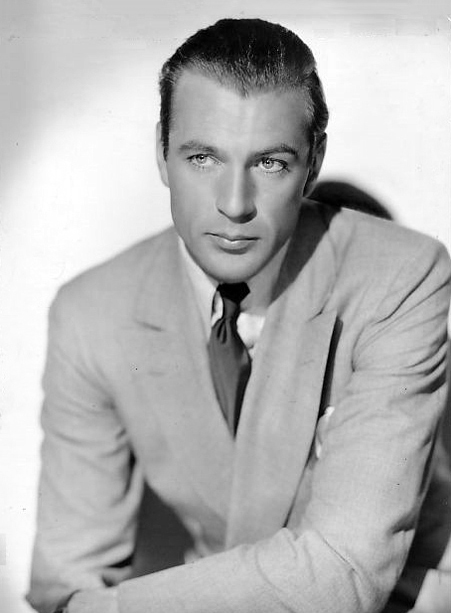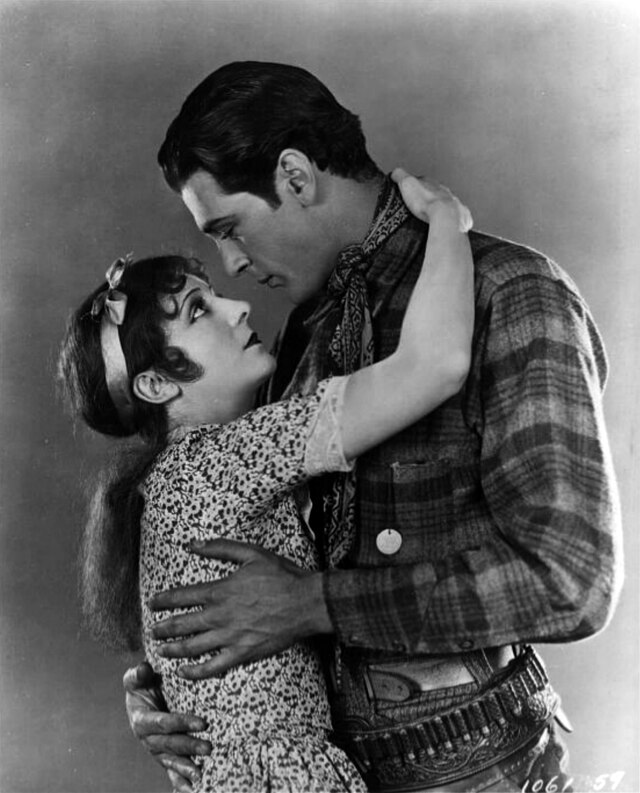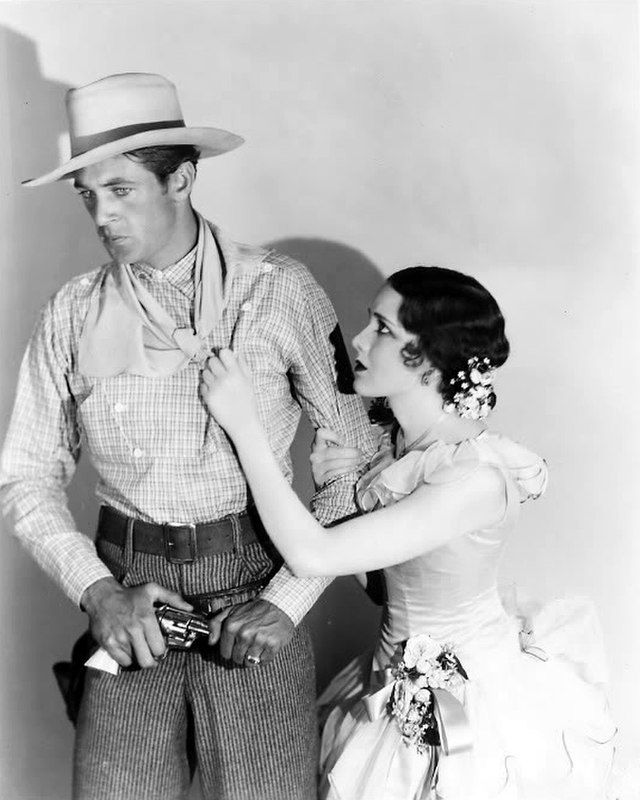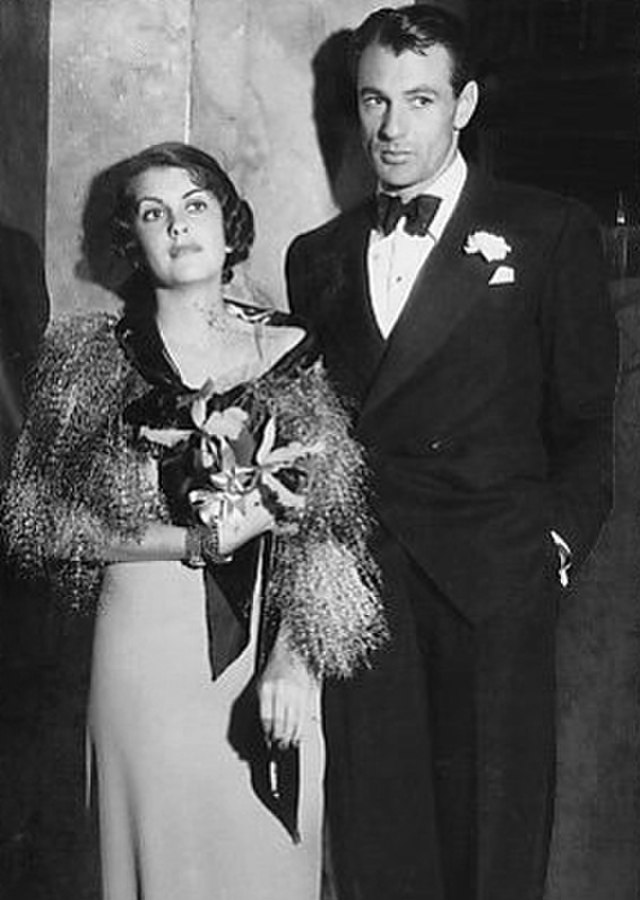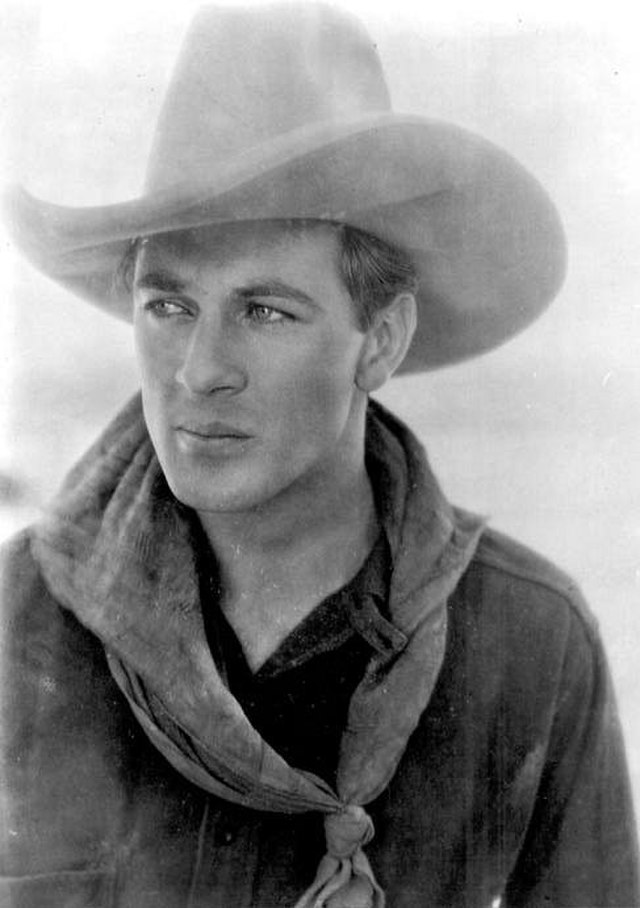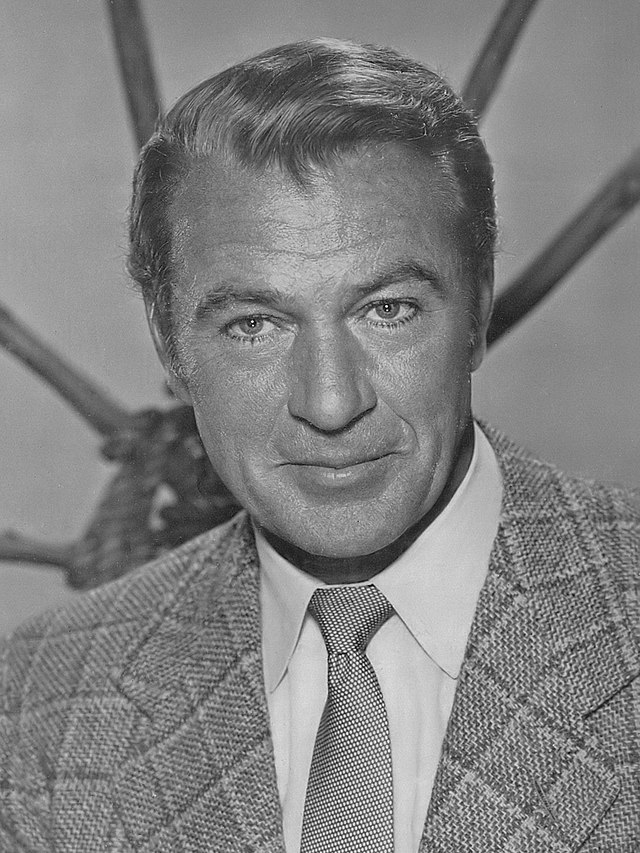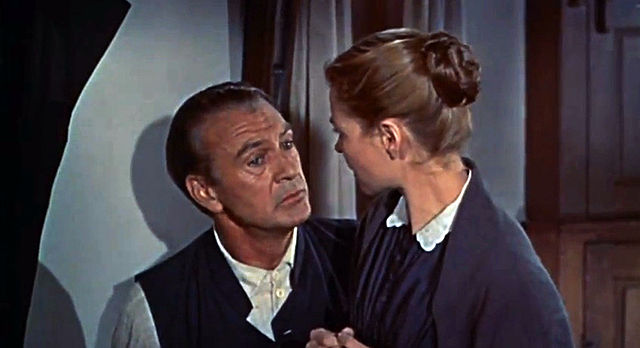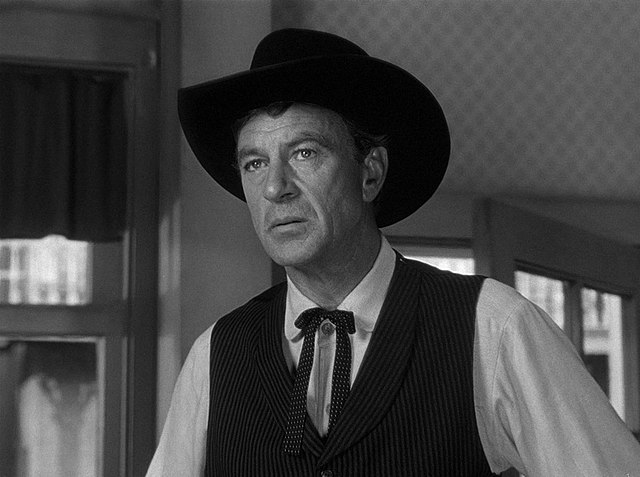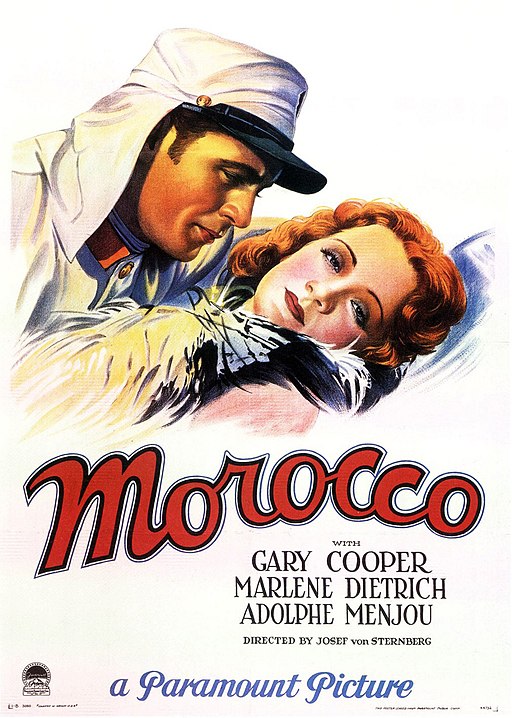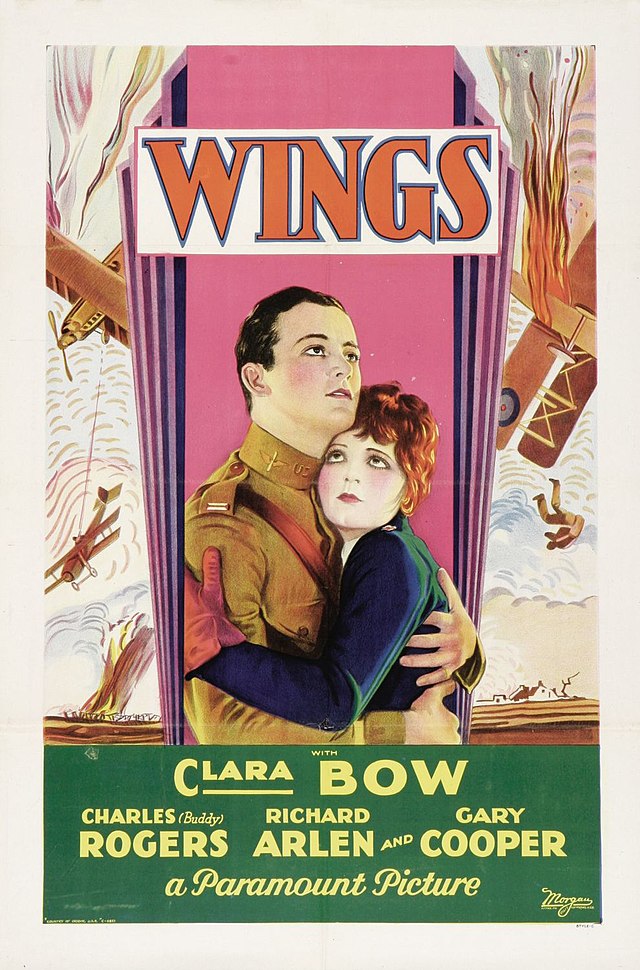Gary Cooper
back| Full Name | Frank James Cooper |
| Stage Name | Gary Cooper |
| Born | May 7, 1901 |
| Birthplace | Helena, Montana, USA |
| Died | May 13, 1961 |
| Buried | Holy Cross Cemetery, Culver City, California, USA |
| Married to | Veronica |
| Children | Maria Cooper (born 1937) |
| Notable films | Wings (1927) - A Farewell to Arms (1932) - Mr. Deeds Goes to Town (1936) - Beau Geste (1939) - Ball of Fire (1941) - High Noon (1952) |
Gary Cooper
The American Cinematic Hero
Gary Cooper was an iconic American actor known for his naturalistic acting style. After moving to Los Angeles in 1924, he transitioned from stunt rider to leading man.
Cooper's breakout came with Wings (1927), and he gained fame with roles in A Farewell to Arms (1932) and Mr. Deeds Goes to Town (1936). He won Academy Awards for Sergeant York (1941) and High Noon (1952). Married to Veronica "Rocky" Balfe, they had one daughter, Maria.
Related
Gary Cooper (1901 – 1961)
Biography, Career and Movies
Gary Cooper was an iconic American actor whose career spanned from the silent film era through the golden age of Hollywood, leaving an indelible mark on the industry with his distinctive acting style and enduring performances.
Early Life:
Frank James Cooper was born on May 7, 1901, in Helena, Montana. His parents, Charles Henry Cooper and Alice (née Brazier) Cooper, were British immigrants. His father was a prominent lawyer and later a Montana Supreme Court Justice. Gary and his brother Arthur spent part of their childhood in England, which gave Gary a distinct accent that later influenced his Western roles. After a car accident in high school, Gary was sent to his family’s ranch in Montana to recuperate, where he developed his love for horseback riding and the outdoors.
Entry into Acting:
Cooper attended Grinnell College in Iowa but left before graduating. In 1924, he moved to Los Angeles to pursue a career in art. However, he found more success as a film extra and stunt rider, which eventually led to acting roles. His early film credits were mostly silent films, where his good looks and natural style made him a standout.
Breakthrough and Stardom:
Cooper’s breakthrough came with the 1926 film The Winning of Barbara Worth. His first major role was in Wings (1927), which won the first Academy Award for Best Picture. As talking pictures emerged, Cooper’s deep, distinctive voice and natural acting style made him a star. His role in A Farewell to Arms (1932) further established him as a leading actor.
Career Highlights:
Gary Cooper’s career was marked by a series of iconic roles that showcased his versatility. In Mr. Deeds Goes to Town (1936), he played the charming and idealistic Longfellow Deeds, earning his first Academy Award nomination. His portrayal of Alvin York in Sergeant York (1941) won him his first Oscar for Best Actor. Cooper's performance in High Noon (1952) as the embattled marshal Will Kane earned him his second Oscar and remains one of his most celebrated roles.
Personal Life:
Cooper married Veronica "Rocky" Balfe, a socialite and New York debutante, in 1933. They had one daughter, Maria Cooper. Despite rumors and occasional affairs, including a well-publicized relationship with actress Patricia Neal, Cooper remained married to Rocky until his death.
Later Years and Legacy:
In the 1950s, Cooper continued to work steadily in film, though he began to experience health problems. He was diagnosed with prostate cancer in 1960. Despite his illness, he continued to work, making appearances in films such as Friendly Persuasion (1956) and Man of the West (1958).
Gary Cooper passed away on May 13, 1961, at the age of 60. He was buried at Holy Cross Cemetery in Culver City, California. Cooper’s legacy endures through his extensive body of work, which continues to be celebrated for its authenticity and enduring appeal. His contributions to the film industry were honored with a posthumous Academy Honorary Award in 1961 for his memorable screen performances and international recognition as a cinematic treasure.
Gary Cooper wins Oscar for Best Actor for High Noon:
Understated Acting Style of Gary Cooper:
Gary Cooper's acting style was defined by his understated and naturalistic approach, which set him apart from many of his contemporaries. His performances were marked by a quiet intensity and an authenticity that resonated deeply with audiences.
Naturalism
Cooper's acting was grounded in naturalism. He had an effortless way of delivering lines and interacting with his co-stars that made his characters believable and relatable. He eschewed theatricality and overacting, which were common in the early days of cinema, in favor of a more subdued and genuine performance.
Physicality
Cooper's tall, lean frame and rugged good looks made him a natural fit for Westerns and adventure films. He used his physical presence effectively, often conveying strength, resilience, and integrity through his body language and movements. His comfort with physical roles, including riding horses and performing stunts, added to the authenticity of his performances.
Subtlety
One of Cooper's trademarks was his ability to convey complex emotions with subtle facial expressions and minimal dialogue. He mastered the art of saying more with less, using his eyes and slight changes in his demeanor to communicate inner turmoil, determination, or affection. This subtlety allowed audiences to project their own interpretations onto his characters, making his performances more personal and impactful.
Integrity and Stoicism
Cooper often portrayed characters who embodied integrity, moral fortitude, and stoicism. His roles frequently involved men of few words who faced adversity with quiet strength and unwavering principles. This persona resonated during the Great Depression and World War II eras, when audiences admired and sought inspiration from such qualities.
Versatility
While Cooper is best known for his roles in Westerns, he demonstrated versatility across genres. He could play charming romantic leads, as in Mr. Deeds Goes to Town, or heroic figures, like in Sergeant York. His ability to adapt to different genres and roles showcased his range as an actor, even within the confines of his understated style.
On-Screen Presence
Cooper had a magnetic on-screen presence that drew viewers in. His charisma was not flashy but rather a quiet magnetism that commanded attention. This presence made even his most reserved characters compelling and memorable.
Voice and Delivery
Cooper's deep, distinctive voice added to his screen appeal. His speech was measured and deliberate, often lending his characters an air of wisdom and thoughtfulness. His vocal delivery was a crucial component of his naturalistic style, reinforcing the authenticity of his performances.
Personal Quotes that Stand Out:
On Acting:
"The general consensus seems to be that I don't act at all."
On His Career:
"Naturalness is hard to talk about, but I guess it boils down to integrity."
On Success:
"I've learned that if you want to reach the top, you can't compromise. You've got to keep moving up, and you can't say, 'I'm tired.'"
On His Roles:
"I don't like to see myself on the screen. I can't stand myself in reels."
On Fame:
"People hang on after they've lost their natural way of behaving and end up acting out of memory, and the memory is often imitative of something they’ve seen and liked."
What Others Said about Gary Cooper:
Fellow Actors:
- James Stewart:
"Coop was the epitome of the star, a man with an image of such natural strength and simplicity that it seemed to be no image at all."
- Ingrid Bergman:
"He had a kind of magnetic simplicity on screen, an instinctive understanding of the characters he played, and an ability to make you feel that whatever he was doing was the right thing to do."
- John Wayne:
"Gary Cooper was a symbol of the American character. He was pure, honest, and straightforward. He was my ideal of what a man should be."
- Marlene Dietrich:
"Gary was not only the most handsome man I ever met, he was also the kindest."
Directors and Producers:
- Frank Capra (Director of "Mr. Deeds Goes to Town"):
"Gary Cooper had a presence, a charm, and a naturalness that made the camera love him. He made everything look easy."
- Howard Hawks (Director of "Sergeant York"):
"Cooper’s strength as an actor was his ability to make the audience believe in his character. He never had to shout or gesticulate to convey power and authority."
Critics:
- Bosley Crowther (Film Critic for The New York Times):
"Mr. Cooper’s strength lay in his complete naturalness. He was not only a convincing actor but also a truly sympathetic and appealing personality."
- Leonard Maltin (Film Historian and Critic):
"Cooper’s greatest gift as an actor was his ability to project integrity and honesty on screen. He became a symbol of the best in American film heroes."
Public and Fans:
Fans often described him as:
"A true gentleman on and off the screen."
"An actor who represented the best of American values."
Public Tributes:
On receiving his honorary Oscar in 1961, Cooper was lauded for his "many memorable screen performances and the international recognition he, as an individual, has gained for the motion picture industry."
Personal Tributes:
- Ernest Hemingway:
Hemingway, whose novel "For Whom the Bell Tolls" was adapted into a film starring Cooper, said, "Cooper is one of the finest actors in the world, a truly great gentleman."
- Patricia Neal:
Actress Patricia Neal, who had an affair with Cooper, said, "He was the best actor I ever worked with. He was also the kindest and most considerate."
Awards and Recognition:
Academy Awards
Wins:
Best Actor in a Leading Role
- Sergeant York (1941)
- High Noon (1952)
Nominations:
Best Actor in a Leading Role
- Mr. Deeds Goes to Town (1936)
- The Pride of the Yankees (1942)
- For Whom the Bell Tolls (1943)
Golden Globe Awards
Wins:
Best Actor in a Motion Picture – Drama
- High Noon (1952)
Honorary Awards
Academy Honorary Award (1961) - For his many memorable screen performances and the international recognition he, as an individual, has gained for the motion picture industry.
New York Film Critics Circle Awards
Wins:
Best Actor
- Sergeant York (1941)
- High Noon (1952)
Laurel Awards
Wins:
- Top Male Star (1958)
- Golden Laurel for Top Male Star (1959)
- Golden Laurel for Top Male Star (1960)
Venice Film Festival
Wins:
Special Jury Prize for Best Actor
High Noon (1953)
Other Recognitions
David di Donatello Awards
- Special David (1960) - For his overall contribution to cinema.
Movies starring Gary Cooper:
1925
- The Thundering Herd (Uncredited): Early silent Western about a buffalo hunter and his adventures.
1926
- The Winning of Barbara Worth: A civil engineer battles nature and personal conflicts to build a dam in the desert.
1927
- Wings: Two World War I fighter pilots compete for the love of the same woman.
- Children of Divorce: Love triangles and the consequences of impulsive marriages among the elite.
1928
- Lilac Time: A romantic drama set during World War I between a British pilot and a French farm girl.
1929
- The Virginian: A ranch foreman stands up to a cattle rustler and wins the heart of his beloved schoolteacher.
1930
- The Texan: An outlaw impersonates a rich man to escape the law but falls in love with a rich woman.
- Morocco: A Foreign Legion love triangle with a cabaret singer and a soldier.
1931
- City Streets: A carnival sharpshooter gets involved with gangsters.
1932
- A Farewell to Arms: A WWI romance between an American ambulance driver and a British nurse.
1933
- One Sunday Afternoon: A love triangle involving a dentist, his wife, and his long-lost crush.
1934
- Operator 13: A Union spy falls in love with a Confederate officer during the Civil War.
1935
- The Lives of a Bengal Lancer: British officers defend the frontier in colonial India.
1936
- Mr. Deeds Goes to Town: A man from a small town inherits a fortune and must navigate New York society.
1937
- The Plainsman: A fictionalized account of Wild Bill Hickok, Calamity Jane, and Buffalo Bill.
1938
- Bluebeard's Eighth Wife: A romantic comedy about a man who has been married seven times.
1939
- Beau Geste: Three brothers join the French Foreign Legion to protect a valuable family heirloom.
1940
- The Westerner: A drifter befriends a notorious judge and gets caught up in a cattlemen's war.
1941
- Sergeant York: The true story of WWI hero Alvin York, a pacifist who becomes a celebrated soldier.
1942
- The Pride of the Yankees: The story of baseball legend Lou Gehrig.
1943
- For Whom the Bell Tolls: An American dynamiter in the Spanish Civil War falls in love while planning a crucial mission.
1944
- Casanova Brown: A comedy about a man trying to retrieve his baby daughter from an adoption agency.
1945
- Along Came Jones: A comedic Western where a mild-mannered cowboy is mistaken for a notorious outlaw.
1946
- Cloak and Dagger: A physicist is recruited by the OSS during WWII to uncover enemy secrets.
1947
- Unconquered: A frontiersman protects an indentured servant from hostile Native Americans and British agents.
1948
- The Fountainhead: An architect fights for his artistic vision and independence.
1949
- The Inspector General: A conman is mistaken for a government inspector in a corrupt town.
1950
- Dallas: A former Confederate officer seeks revenge against the outlaws who wronged him.
1951
- You're in the Navy Now: A comedy about the crew of an experimental Navy ship during WWII.
1952
- High Noon: A marshal faces a gang of killers alone as his town turns its back on him.
1953
- Return to Paradise: A drifter settles on a tropical island and challenges the local customs.
1954
- Vera Cruz: Mercenaries during the Mexican Revolution switch sides for gold.
1955
- The Court-Martial of Billy Mitchell: The true story of an Army officer who risks his career to advocate for air power.
1956
- Friendly Persuasion: A Quaker family deals with the Civil War's impact on their pacifist beliefs.
1957
- Love in the Afternoon: An aging American playboy falls in love with a young Parisian girl.
1958
- Man of the West: A reformed outlaw is forced to confront his criminal past.
1960
- The Hanging Tree: A doctor with a dark past saves a woman in a small frontier town.
1961
- The Naked Edge: A man is suspected of murder, and his wife tries to prove his innocence.

